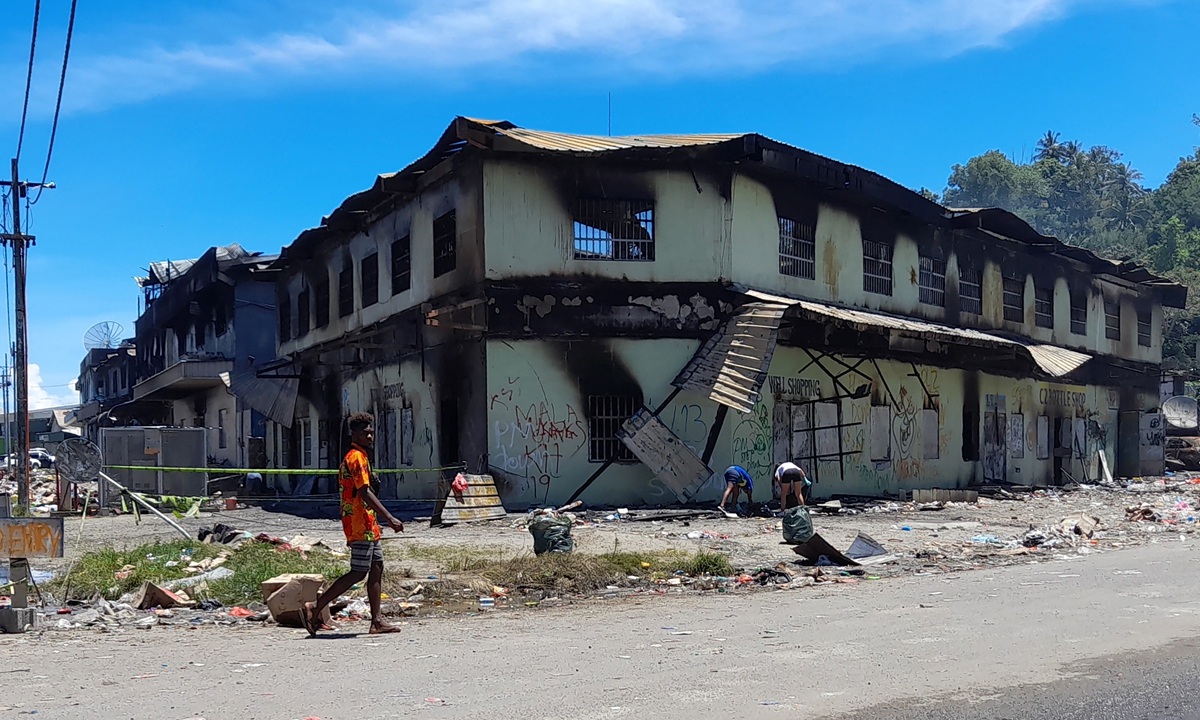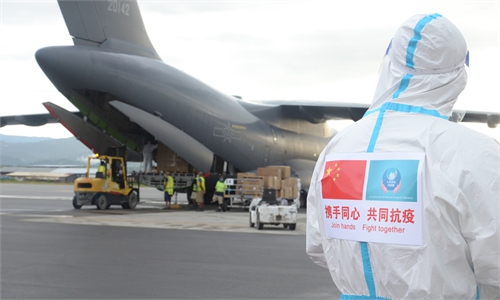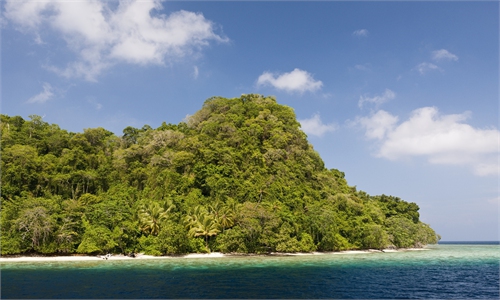Hegemonic and colonist mentality behind Australia’s threats to invade Solomon Islands

A man walks by ruins on November 28, 2021 after days of riots in Honiara, the Solomon Islands. Photo: AFP
It's ridiculous that Australia, on one hand, has closely followed the US in condemning what it perceives Russia's "brutal and unprovoked invasion" of Ukraine, but on the other, its elites bluntly threatened to invade its neighbor in the South Pacific and foster a regime change.
A Reuters report on Thursday saying that a proposal for a broader security agreement with China that would be sent to the Solomon Islands' cabinet for consideration has caused shockwaves through Canberra. David Llewellyn-Smith, founding publisher of?MacroBusiness?and former owner of leading Asia-Pacific foreign affairs journal?The Diplomat, suggested a day later that Australia "must ready Solomon Islands invasion." Calling the China-Solomon Islands deal "Australia's Cuban missile crisis," Smith said "If it must, the nation [Australia] should invade and capture Guadalcanal such that we engineer regime change in Honiara" to protect Australia's "sovereignty and democracy."
Australian elites threatened to invade Solomon Islands simply because the latter hopes to strengthen security cooperation with China. Canberra has carried out much military cooperation with the US, including signing the AUKUS deal that will help it acquire nuclear-powered submarines. Don't Canberra's actions pose a greater threat to China?
"This shows the hypocrisy and double standards of Australia's frantic elites," said Chen Hong, director of the Australian Studies Center at East China Normal University. Chen noted that it also lays bare Australia's ingrained hegemonic and colonialist mentality toward South Pacific island countries. Australia has no respect for the Solomon Islands and other South Pacific island countries at all, instead, it has long regarded them as its backyard, treating island countries in the region as sphere of influence or even vassal states. "When these countries hope to expand relations with others, Australia instantly reacts hysterically," Chen stressed.
Australia is trying to obstruct the Solomon Islands' normal cooperation with China even with the threat of an invasion. This shows Australia's obsession with hegemonism. Chen said Australia has long been seeking to be the "minor hegemon" in the South Pacific region. To this end, Australia maliciously distorted the security cooperation between China and the Solomon Islands.
The bilateral cooperation in law enforcement and security areas in fact is a response to last year's riots in the Solomon Islands during which Chinese nationals there suffered great losses with their shops smashed, burned and looted and their personal safety in jeopardy. Given the presence of Chinese nationals in the Solomon Islands and with the development and expansion of normal ties between the two countries, it's natural for the two sides to beef up security cooperation.
However, many Australian politicians, analysts and media outlets smeared this cooperation as a Chinese attempt to establish a military base in the Solomon Islands, hyping it would harm Australia's interests and destabilize the region. Military expert Song Zhongping believes Australia is "experiencing persecutory delusions" in which whatever China does in the South Pacific region will be portrayed as "threats" to Australia. "This won't help Australia win the trust of the island countries in the region, but will only expose Australia's hysterical and ugly face," Song noted.
No matter how hard Australia tries to twist the facts and smear China's intention, the cooperation between China and the Solomon Islands and other South Pacific island countries will become more diverse and enriched. China has provided South Pacific countries with more options in terms of economic and security development. Cooperation with China is popular among locals as it is conducted on an equal footing, is mutually beneficial and has no political conditions attached.
The waning of the Australian influence in the South Pacific region is because of Australia's hegemonic mindset toward those countries. No country in the region would expect Australia, which can easily threaten to invade, to truly help its development.



